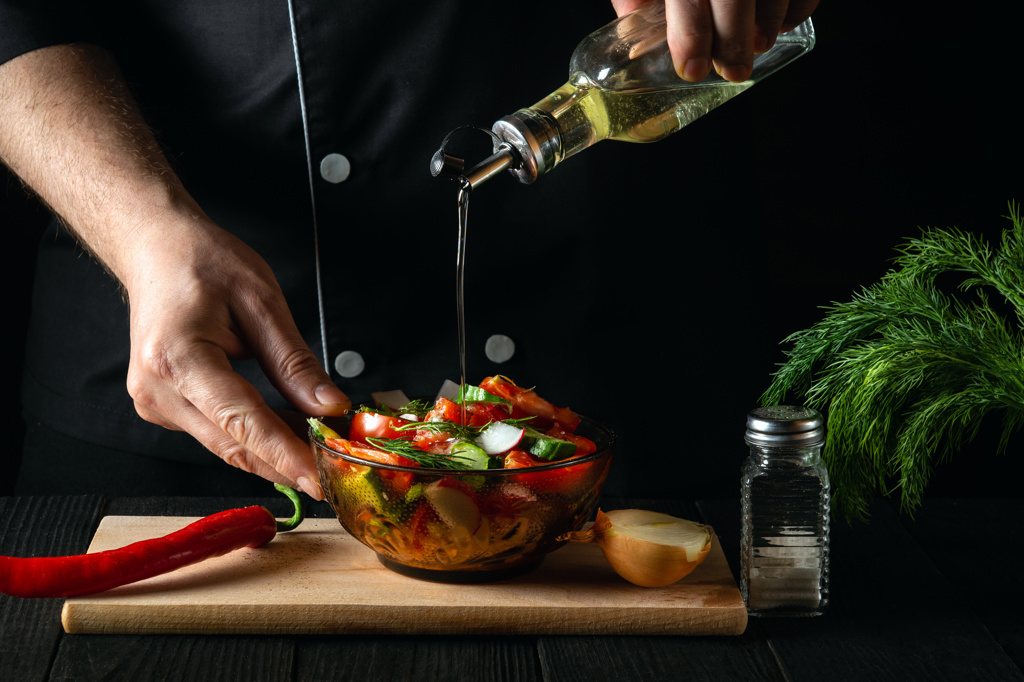Edible food oils: Are you getting what you pay for?

It is not only consumers who get misled by adulterated or compromised edible food oils, brands and manufacturers in the industrial food industry do too. Here, Jo Deighton, Oleon Nutrition’s UK commercial manager, weighs in on some reasons why the industry is seeing such a proliferation in adulterated and inauthentic food oils, and what to consider when engaging with new suppliers or product lines.
It's impossible to imagine a food industry without edible food oils. The sector is vast, spanning from commercial seed oils such as Sunflower, Rape, and Soya to more specialized vegetable and plant-based varietals in our new Lucee range. When it comes to the choice of edible oils the line-up is vast and constantly changing as the industry discovers new types and processing techniques to extract oil from seed and vegetal sources.
The benefits of edible food oil are well documented. Not only do these ingredients offer great nutritional benefits, but they can also impart a pleasant flavor, healthfulness, mouthfeel, and texture to food items. With health and wellness being key motivators for brands and a growing number of consumers interested in healthy and sustainably sourced oil solutions, it is also opening the door to some of the food industry’s biggest challenges: adulteration and food fraud.
It's easy to adulterate
When we start unpacking adulteration, one of the most prolific ways is to blend inferior oils or those from alternative sources with high-cost, specialized products. These ‘inferior’ products are then sold at a lower price than the more authentic items. This is one of the easiest ways to adulterate edible food oil as there are often a great number of physical similarities between the different oils.
We see this in two products reputed to be some of the most adulterated edible food oils - Olive and Avocado Oil.
Current estimates tell us that less than 10% of global Olive Oil production meets the criteria for labeling as Extra Virgin, although estimates put the amount of oil retailed as Extra Virgin at 50%.
Extra Virgin Olive Oil is often diluted with cheaper olive or other vegetable oils, which ultimately affect a product's quality, nutritional, and commercial value.1 When it comes to Avocado Oil the statistics are even scarier. Researchers at the University of California, Davis, analyzed samples of 36 private-label Avocado Oil products and graded them based on quality and purity. Their findings, published in the journal Food Control, show that only 31% of the samples tested were pure, and 36% were of advertised quality.2 In the main, researchers concluded that low-cost products indicate a higher probability for adulteration, but that high cost didn’t guarantee purity or quality either.
Why is oil adulteration at an all-time high?
Various factors contribute to oil adulteration and unethical practices in the edible food oil chain. Some of the more common causes include a combination of economic, regulatory, and social factors, but it is worth exploring some of these in-depth.
Maximizing profits is probably the biggest reason. Adding or blending cheap and inferior substances to food products allows unscrupulous traders to increase volumes. Selling more products but at a lower production cost can significantly boost profits.
In addition, supply chain challenges and complexity and the globalization of the supply chain have a massive role to play. Currently, we are seeing the conflict in Ukraine and ongoing disruption by Houthi rebels in the Red Sea affecting two of the busiest trading routes. If you factor in natural impacts such as drought and floods on harvests, these can have a significant impact on availability and cost. To meet demand, unscrupulous suppliers often resort to adulteration for a quick fix to provide products to their clients, and to meet market requirements. When linked to vast enforcement gaps that exist and lax enforcement of food safety standards, it provides fertile ground for adulteration.
This also ties in with a lack of consumer education as some shoppers struggle to differentiate between genuine and adulterated products. This lack of awareness allows adulterated items to infiltrate the market.
Advancements in technology also have a role to play, ushering in more intricate methods of adulteration that are challenging to detect without the correct testing equipment and trained personnel. This scenario makes it easy for weakened quality assessment to allow products to slip through without detection. Food supply chain complexity poses significant difficulties in tracking the origin and authenticity of products, thereby creating weak points where adulteration can occur undetected.3
The Oleon Nutrition guarantee
Routine oil authenticity testing should form an important part of any oil supply chain, as the test results provide critical assistance in valuing oils for the marketplace.4
While we know that technology alone cannot prevent fraud, there are several innovative ways to reduce food fraud with digital traceability systems that can track a food product’s journey through the supply chain and pinpoint the origins.5
At Oleon Nutrition, we applaud all systems that can prevent oil adulteration, but we also advocate an integrated approach that not only makes use of quality and testing, but a critical risk assessment to reduce vulnerability in the supply chain. One of our priorities is to foster direct relationships with our suppliers that are aligned with our philosophy of ‘Serving the Earth’, putting sustainability, traceability, and trust at the forefront of everything we do, while our dedicated testing and laboratory facilities mean you can choose all Oleon Nutrition products with confidence.
For more information on our range of commercially available seed oils and our new Lucee range, contact the sales team today.
References:
1,4 Oil authenticity: testing, regulations, and shortfalls (factssa.com)
2,70% of Private Label Avocado Oil Rancid or Mixed with Others | UC Davis
3, Food Adulteration: Causes, Types, and How To Avoid (tataaig.com)
5, Food fraud: can we trust the authenticity of our food? - EIT Food

